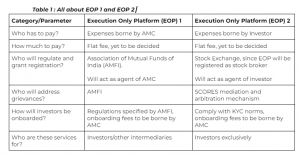SEBI issues rules for execution only platforms: All you need to know
- Ira Puranik
- Last Updated : June 14, 2023, 16:47 IST

Do you use applications like Paytm Money, Groww, ET Money, Zerodha Coin or others to invest directly in mutual funds? Then, this news is just for you. Market watchdog SEBI (Securities and Exchange Board of India) has come out with a framework for regulating Execution Only Platforms (EOPs). This will come into force starting September, 2023.
Read on to know all about such platforms, and what is going to change for you.
First off, what are EOPs? Simply put, any digital platform that lets you subscribe, redeem or switch transactions in your direct mutual fund schemes is an EOP. Apart from such financial services, you can also change details like email ID, phone number.
Notably, platforms offered by SEBI RIAs and stock brokers to their clients and advisories wont come under the purview of this. Per the new SEBI framework, these EOPs will be divided and mandated to register into one of these 2 categories, namely EOP 1 and EOP 2. Here’s a breakdown of their characteristics:

Will it benefit you?
Yes and No. Says Agra-based mutual fund distributor Shifali Satsangee, “Norms pertaining to SEBIs circular, allowing platforms to choose between EOP1 and EOP2 will eventually turn direct plans expensive for the investors since direct plan platforms would charge a transaction fee either from AMCs or investors which may discourage investors to invest through direct platforms”.
On the other hand, it would enable brokers who only earned on regular plans now to monetize on the direct plans, too, she notes. “One needs to be cognizant that EOPs may have an incentive for splitting transactions into small parts to earn more”, she added.
Secondly, since the EOPs cannot list products based on ratings and rankings nor advertise any scheme name or brand, whether main or associated, investment- decision making for investors could get arduous and tiresome.
What is also noteworthy is that till date, around 77% of mutual fund investments in India come through distributors. Direct investment in MFs make up for a small, although growing chunk of the Rs 43.20 trillion MF industry.
So, though distributors will remain relevant,” they will be pushed up to their game”, says Paddy Raghavan, who heads Multipl, a lifestyle investment management application.
But by far, the biggest impact of these guidelines will be to distinguish between advice and execution of direct mutual fund plans. Prior to such EOPs, investors had no chance but to go to the MF site of each fund house to make make changes. These EOPs, however, will not be able to offer regular mutual fund plans.
But, will direct mutual funds get expensive?
Some experts disagree. Says Gaurav Rastogi, who heads Kuvera, “Currently, these platforms use BSE or MFU for transaction processing. They directly charge transaction fees from AMCs, which in turn, are subsumed in overall AMC expenses. In fact, competition for execution mandate leads to lower costs and better service”.
However, more clarity is awaited on the matter. But as things stand, experts believe that this move does not stand to impact the user much. Given the user-friendliness that the platform is required to have and growing affinity of direct plans, more and more people will migrate towards such direct schemes, which will help in keeping the overall cost low.
So, what do these differentiations entail?
While EOP 1 incentivize the creation of infrastructure that compares to BSE and MFU, so that some AMC expenses are diverted here as well, EOP 2 will continue utilizing existing structures. There will be no change in execution of direct plans, hence, minimal or no impact on overall cost.
Download Money9 App for the latest updates on Personal Finance.
Related
- बाजार के उतार-चढ़ाव में भी आब्रिट्राज फंडों ने दिया एफडी से ज्यादा रिटर्न
- इन 5 म्यूचुअल फंड्स ने 5 साल में दिया 20 फीसदी से ज्यादा का रिटर्न
- ये हैं टॉप 10 लार्ज कैप म्यूचुअल फंड, जिन्होंने दिया है 10 फीसदी से ज्यादा का रिटर्न
- ये हैं बंपर रिटर्न देने वाली टॉप म्यूचुअल फंड स्कीम, अकेले इस मिडकैप ने 12 महीने में दिया 57 फीसदी का मुनाफा
- कितने तरह के होते हैं ETF, आपके लिए क्या है बेहतर?
- ETF में पैसे लगाने के 4 बड़े फायदे, Investment से पहले जान लें ये बातें

